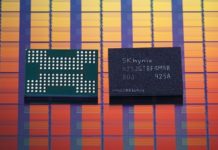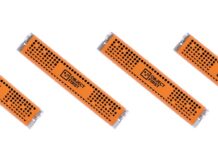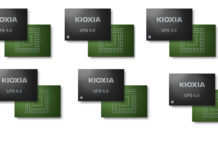Apache released Airflow 2.9, the latest version of the popular open source project, a data orchestration tool with more than 12 million monthly downloads and 33,000 GitHub stars. Airflow 2.9 brings more than 35 new features and over 70 improvements including enhancements to data-aware scheduling and dynamic task mapping. According to the 2023 State of Airflow Survey, these features are key for common use cases like ETL and MLOps.
…
Arcitecta will be in the Dell Technologies booth #SL8065 at NAB 2024 discussing how Dell PowerScale and Arcitecta Mediaflux provide elite data orchestration, workflow automation, and edge caching, all monitorable from a single global namespace.
…
CAST AI, a Kubernetes automation platform, announced AI Optimizer, a new service that automatically reduces the cost of deploying large language models (LLMs). It integrates with any OpenAI-compatible API endpoint and automatically identifies the LLM across commercial vendors and open source that offers the most optimal performance and the lowest inference costs. It then deploys the LLM on CAST AI-optimized Kubernetes clusters, unlocking generative AI cost savings. AI Optimizer comes with insights into model usage, fine-tuning costs, and explainability in optimization decisions – including model selection.
…
Data connectivity supplier CData Software has acquired Data Virtuality to provide customers with a suite of data replication and live data access tools compatible with on-premises, cloud, or hybrid environments. Data Virtuality delivers live connectivity for direct system-to-system data access without relocation, as well as data virtualization solutions for a unified, governed semantic layer. It readily complements and extends CData’s existing Drivers products, which provides point-to-point system connectivity, and Connect Cloud, which enables multi-point connectivity across cloud applications. CData claims it’s the only data management vendor to bring a bi-modal integration stack to market, allowing customers to leverage both data replication and live data access within one common connectivity platform.
…
Cloud connectivity supplier Cloudflare says developers can now deploy AI applications on Cloudflare’s global network in one click directly from Hugging Face, without the need to manage infrastructure or incur costs for unused compute capacity. It adds that Workers AI, an at-scale platform for running AI inference at the edge, is now GA with GPUs deployed in more than 150 cities, and Python support now available in open beta. Cloudflare also announced its instant serverless relational database, D1, is now generally available.
On top of this Cloudflare announced updates for R2, its globally distributed object storage:
- Event Notifications: R2 is now able to automatically trigger Workers, taking action with data in R2 bucket changes
- Super Slurper for Google Cloud Storage: Developers can now easily migrate data from Google Cloud to Cloudflare R2
- Infrequent Access Private Data: Developers will now pay less to store data that isn’t accessed frequently
For more information, head to Cloudflare’s website.
…
Data management supplier Denodo has a partnership with Google integrating the Denodo Platform with Google Cloud’s Vertex AI and combining logical data management capabilities with GenAI services with access to state-of-the-art LLMs. Narayan Sundar, Senior Director, Strategic Alliances, said: “Using Denodo’s logical/semantic-model approach, enterprises across industries can integrate and manage data and apply Retrieval Augmented Generation (RAG) techniques that combine the capabilities of a pre-trained large language model with external data sources.” There’s more information here.
…
Deduping backup target system supplier ExaGrid has appointed Sam Elbeck as its VP of Americas Sales and Channel Partners. He comes from being VP of Sales and Partnerships Americas for Arcserve, and, prior to that, Senior Global Director of Sales for Digital Compliance and SaaS Backup at Veritas. He was also VP of Sales and Business Development for Globanet, and held sales and technical leadership roles at both Symantec and IBM.
…
ExaGrid announced continuing growth with its strongest first quarter (Q1) in the company’s history, for the quarter ending March 31, 2024. It is profitable, and cashflow-positive, and has been for 13 consecutive quarters. The customer count has risen from over 4,100 last quarter to more than 4,200 at the end of Q1. Some 75 percent of new bookings are for 6- and 7-figure deals and its competitive win rate is around 70%.
…
Data orchestrator Hammerspace has joined the STAC benchmark council. STAC is a respected benchmark in the financial services arena.
…

In-memory data grid supplier Hazelcast appointed Dr Stephen Weston as its chief scientist. He will lead its AI research and development, and be instrumental in guiding the company’s strategy and application of AI within the Hazelcast Platform and the product roadmap. Previously, Weston was managing director in global credit trading at JPMorgan Chase. Most recently, as a partner in the Risk Advisory practice at Deloitte LLP, he managed the transition to machine learning and agent-based models for risk management, model development, and model validation. In addition to his position as chief scientist at Hazelcast, Weston supervises academic research in the department of computing at Imperial College London, where the research group develops models that integrate technology, science and finance.
…
SaaS data protection supplier Keepit has signed Ingram Micro as a US distributor in a strategic go-to-market deal. Ingram Micro will help market, sell, and support the Keepit portfolio
…
Composable systems supplier Liqid has an UltraStack system that can transparently connect up to 20 GPUs to a standard server. It has published an UltraStack Performance Whitepaper with UltraStack connected to Dell R760 and R7625 servers. The purpose of one set of MLPerf 3.1 benchmark tests was to prove the Nvidia L40S could outperform the well-regarded A100 PCIe GPU in certain inference workloads. They were conducted on two servers with GPUs composed by Liqid Matrix. One server contained 4 x L40S PCIe GPUs and the other 4 x A100 PCIe GPUs. Results indicate that the L40S GPUs not only matched but in certain aspects surpassed the performance of the Nvidia A100 PCIe GPUs. Download the white paper here.
…
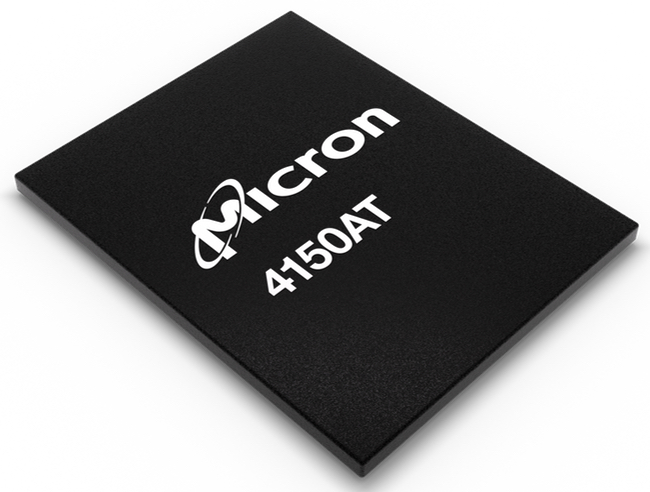
Micron is sampling its automotive-grade 4150AT SSD, the first quad-port SSD, capable of interfacing with up to four systems-on-chips (SoCs) to centralize storage for software-defined intelligent vehicles. It supports single-root input/output virtualization (SR-IOV), a PCIe Gen 4 interface and ruggedized automotive design. Random read/write IOPS are up to >600,000/>100,000 respectively. The 4150AT can handle data streams from multiple SoCs at once, making it suited for vehicles that must multitask to handle diverse systems, from advanced driver-assistance systems (ADAS) to in-vehicle infotainment (IVI) and AI-enabled cabin experiences.
…
Storage array supplier Nexsan is celebrating its 25th anniversary since being founded in 1999. It has more than 2,600 systems with over 624 PB actively deployed and under maintenance (2023).
…
Objective Analysis analyst Jim Handy has collated semiconductor fab responses to the April 3 earthquake in Taiwan.
- Micron said all of its team members have been accounted for and reported to be safe. It’s evaluating the impact to its operations and supply chain, and will communicate changes to delivery commitments after this evaluation is completed.
- TSMC stated that over 70 percent of its tools had recovered within 10 hours of the earthquake, and that operations at its most advanced factory, Fab 18 in Tainan, had surpassed 80 percent.
- Winbond stated that there were no injuries to personnel. Some machinery at the Taichun and Kaohsiung fabs activated self-protection mechanisms due to the earthquake, but overall there was no significant impact on the company’s operations and finances.
- UMC announced that the earthquake had no material impact on its operations. All personnel are safe, but automatic safety measures at the company’s fabs in Hsinchu and Fab 12A in Tainan were triggered, and some wafers in the production line were affected. Currently, operations and wafer shipment are resuming as normal, and there will be no meaningful impact on UMC’s finances and business.
…
Researchers at Dongguk University in Korea have devised an opto-electronic memory (OEM) device with a floating gate built from a 2D van der Waal heterostructure (vdWhs) composed from ordered layers of rhenium disulfide (ReS2)/hexagonal boron nitride (hBN)/tellurene (2D Te). This the ReS2/hBN/2D Te vdWh device exhibits high long-term stability (>1,000 cycles), a high on/off switching ratio of the order of 10⁶, and impressive data retention (>10⁴), owing to the opto-electrical properties of ReS2 and 2D Te. The non-volatile device can support multi-bit storage states by varying the gate voltage, input laser wavelength, and laser power, enabling complex data patterns and high data capacities. It can perform fundamental OR and AND Boolean logic gate operations by combining electrical and optical inputs.
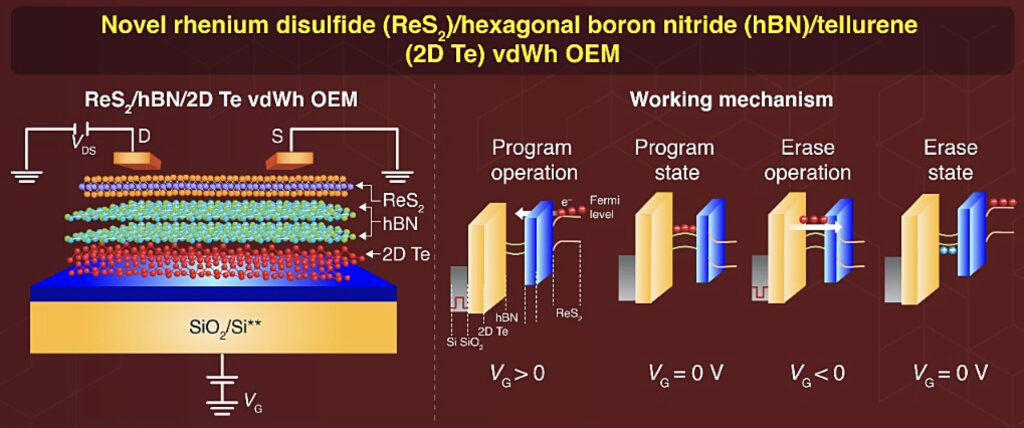
Access the researchers’ paper here.
…
SpaceBilt Inc., which develops reusable spacecraft, has partnered with SSD and controller supplier Phison to fly the Large in Space Server (LiSS), a 100 TB-plus storage and edge compute system, to the International Space Station (ISS) in 2025. The LiSS server system is powered by a Microchip Polarfire SoC along with an Nvidia Jetson Orin AI computer for rapid access to a string of X1 enterprise level PCIe-based solid state drives (SSDs) provided by Phison. SpaceBilt and partner Novium will provide demonstrations of a mockup space station at the Space Symposium, April 8-11, 2024 in Colorado Springs. Phison’s 8 TB M.2 2280 SSD system was previously selected to take part in Lonestar Data Holdings’ first lunar datacenter mission.
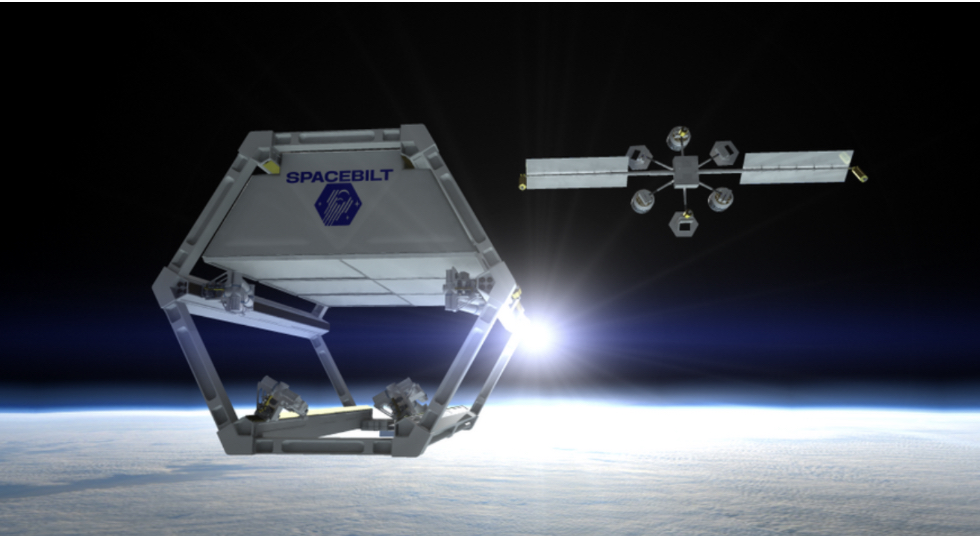
…
Vector database supplier Pinecone has launched a Pinecone Partner Program. The new program provides select partners with benefits to deliver competitive AI-building capabilities to their customers. They include streamlined integration options for a seamless user experience, usage reporting for greater visibility, and sales, marketing, and technical support to drive successful adoption. The program is launching with industry-leading and rapidly rising companies as launch partners, including Anyscale, Confluent, LangChain, Mistral, Monte Carlo, Nexla, Pulumi, Qwak, Together.ai, Vectorize, and Unstructured, with more to be announced.
…
Clayton Dubilier & Rice (CD&R) has entered into a definitive agreement under which its funds will acquire a majority ownership position in Presidio from BC Partners, which will retain a minority interest. Presidio has more than 6,600 customers. Among its portfolio is PRISM, which offers surveys into a customer’s AWS RI usage and presents a savings model based on its data. If the customer signs a PRISM deal, Presidio buys AWS services upfront on the customer’s behalf, freeing up cash and capital costs. BC Partners acquired Presidio in 2019, delisting the company from Nasdaq in a $2.1 billion take-private transaction. The transaction is expected to close in the second quarter of 2024, subject to customary closing conditions.
…
Data management supplier Reltio announced its Customer 360 Data Product, a next-generation AI cloud offering that provides a comprehensive view of customer data in milliseconds. It provides a comprehensive view across multiple first and third-party sources for domains, including connected customer, product, supplier, location, and more. Reltio’s Flexible Entity Resolution Networks (FERN) for rule-free matching takes automation in data unification to the next level. Using LLM-powered pre-trained ML models, this approach to entity resolution enables rule-free matching with high match accuracy across industries and with minimal effort. A Reltio Intelligent Assistant (RIA), using GenAI and natural language technology, makes it easier for users to search digital content. More information here.
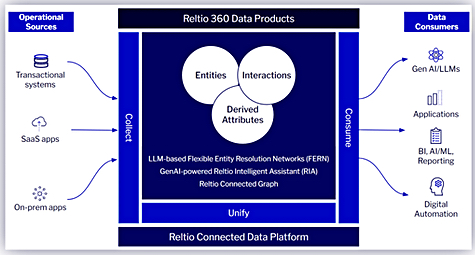
…
Seagate has quietly added a BarraCuda 530 PC SSD to its US website’s product lineup section. It is an M.2 2280 format drive, with a PCie gen 4 x 4 interface, and 512 GB, 1 and 2 TB capacities. It looks like a successor to the 2020-era BarraCuda 520, which supported NVMe v1.4. The 530 updates this to NVMe 2.0 and also extends the warranty period from three to five years. It has greatly improved performance compared to the 520 with the max sequential read speed up to 7.4 Gbps from 5 Gbps and sequential write speed up to 6.4 GBps from 4.2 GBps. As with the 520, no IOPS numbers are available. The 520 capacity range extends to 4 TB so, possibly, the 530 could get a 4 TB model as well. No NAND details are provided and we assume, for now, it’s 3D NAND with TLC format cells.
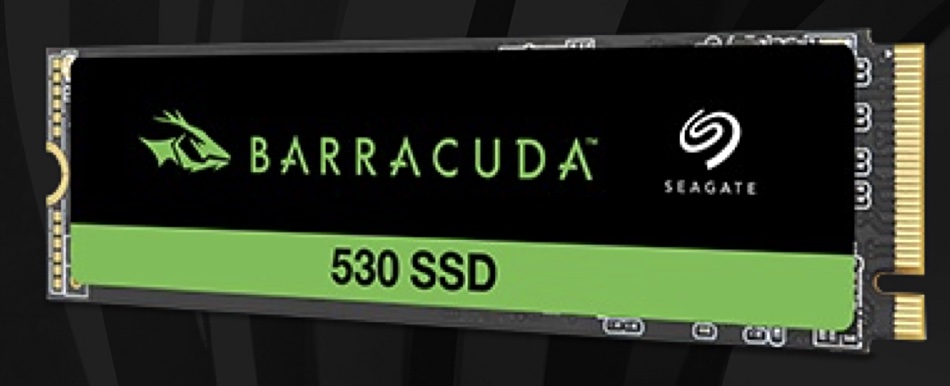
…
High-availability supplier SIOS has joined the Nutanix Elevate Partner Program and gained Nutanix Ready validation designation for its LifeKeeper and DataKeeper products. SIOS has more than 80,000 licenses installed globally.
…
NAND and DRAM fabricator SK hynix will invest an estimated $3.87 billion in West Lafayette, Indiana, to build an advanced chiplet packaging fabrication and R&D facility for next-generation HBM4 products. It could bring 1,000 jobs to the region. SK hynix plans to begin mass production in the second half of 2028, while the new facility will also develop future generations of chips and house an advanced packaging R&D line. SK hynix has risen past a $100 billion stock market capitalization on the back of booming HBM demand. It has 90 percent of the HBM market.
…
Research house TrendForce says burgeoning demand in the AI market since early 2023 has sparked a surge in high-capacity HDD products. A supply shortage for large-capacity HDD products will persist throughout this quarter and possibly extend for an entire year. HDD prices are expected to continue rising in the second quarter of 2024, with a potential increase of 5-10 percent. HDD prices have been static amid SSD competition.
…
Veeam has added KVM support to its backup and recovery offerings, with Oracle Linux KVM and Red Hat Virtualization protected. More information here.




